Government meeting to activate Apple Pay in Iraq
Government meeting to activate Apple Pay in Iraq
A government source revealed, on Tuesday, that the committee concerned with activating Apple Pay services held a virtual meeting with the regional managers of Apple International to make the Apple Pay service available to users in Iraq with the aim of enhancing electronic payments. The source stated to the official agency, “As part of the Iraqi government’s efforts, and under the direct guidance and follow-up of Prime Minister Mohammed Shia Al-Sudani, to develop the electronic payment infrastructure and expand the use of modern technologies to contribute to enhancing financial inclusion and digital transformation, the committee concerned with activating Apple Pay services held a virtual meeting with the regional managers of Apple International to discuss the technical and administrative requirements necessary to launch the service in Iraq.”
He added that “the meeting was attended from the Iraqi side by Advisor to the Prime Minister and Chairman of the Committee for Activating Electronic Payment Services, Saleh Mahoud Salman, Director General of Electronic Payment Systems at the Central Bank of Iraq, Adnan Asaad, and Director of Information Technology at the Communications and Media Commission, Mohammed Al-Gharbawi.” He pointed out that “from the Apple side, the meeting was attended by Omar Al-Rifai, Director of Government Affairs for Apple Pay Services in the Middle East and Pakistan, Mike Powell, Director of Apple Pay Services in Europe, the Middle East, India and Africa, Adham Fahmin, Director of Legal Affairs for Apple Pay Services in Europe, the Middle East, India and Africa, Prince Zander, and a legal expert for Apple Services, Sam Butcher.”
The source also explained that “the meeting reviewed the roadmap and technical and administrative requirements necessary to activate the service in Iraq, and discussed the mechanisms for its integration with the national electronic payment system, in addition to answering relevant technical inquiries.” He pointed out that “at the end of the meeting, it was agreed to hold a follow-up meeting within the next two weeks to complete the technical and operational preparations, leading to achieving the desired goal of making the Apple Pay service available to users in Iraq, in line with the government’s program to develop the electronic payments sector and support the transition to a digital economy.”
Burathanews.com
Parliament crisis ends with a “fraternal reconciliation” between Al-Mashhadani and Al-Mandlawi.
Parliament crisis ends with a “fraternal reconciliation” between Al-Mashhadani and Al-Mandlawi.
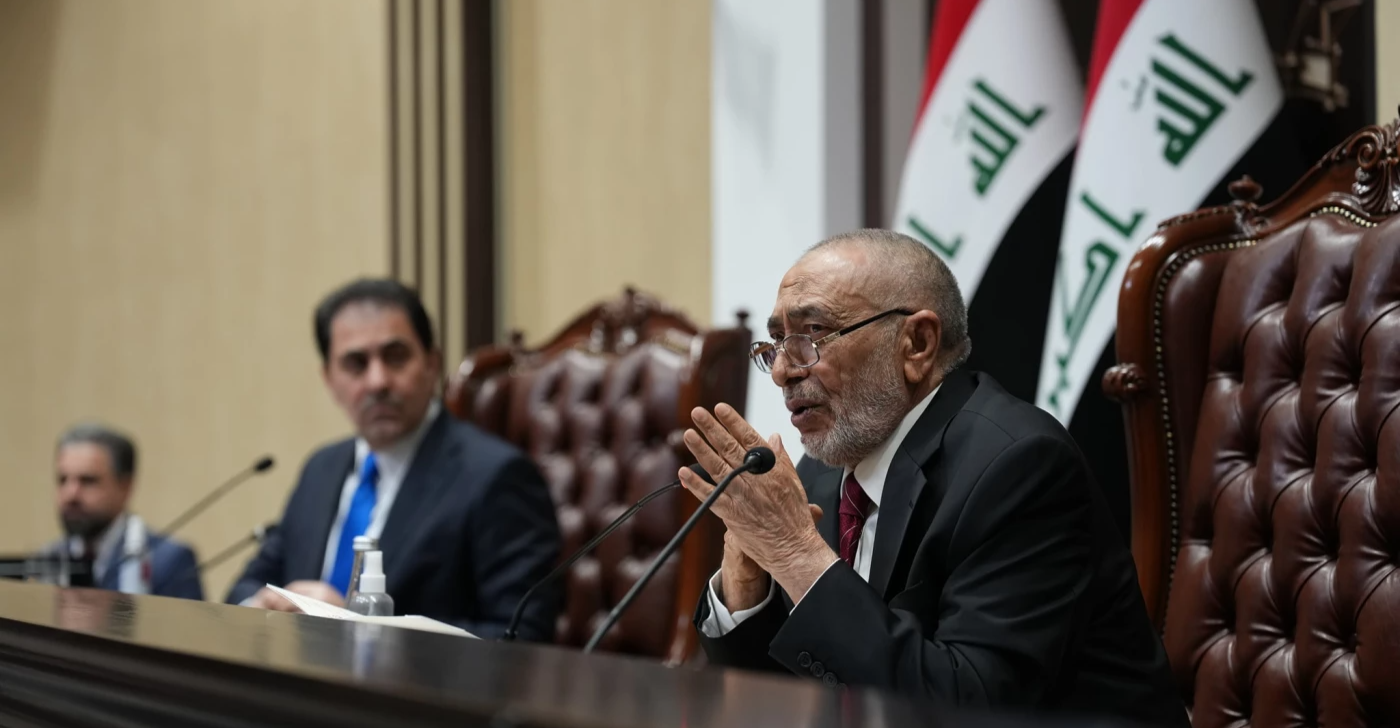 A parliamentary source reported on Tuesday that a reconciliation had taken place between Parliament Speaker Mahmoud al-Mashhadani and his deputy, Mohsen al-Mandalawi, following the altercation that occurred between them during yesterday’s parliamentary session.
A parliamentary source reported on Tuesday that a reconciliation had taken place between Parliament Speaker Mahmoud al-Mashhadani and his deputy, Mohsen al-Mandalawi, following the altercation that occurred between them during yesterday’s parliamentary session.
A source told Shafaq News Agency, “Deputy Speaker of Parliament Shakhwan Abdullah held a fraternal meeting between Speaker of Parliament Mahmoud Al-Mashhadani and First Deputy Speaker Mohsen Al-Mandalawi. During the meeting, an agreement was reached to address the problems that occurred in yesterday’s session, Monday, and to continue cooperation and ensure the work of Parliament continues and sessions are held.”
He added, “The attendees agreed to resume the sessions and hold a session on Wednesday or Thursday of this week.”
On Monday, a parliamentary source revealed that a verbal altercation broke out inside the House of Representatives between Parliament Speaker Mahmoud al-Mashhadani, First Deputy Speaker Mohsen al-Mandalawi, and a number of Coordination Framework MPs, leading to the postponement of today’s session.
The source told Shafaq News Agency that the dispute erupted over Al-Mashhadani’s recent statements regarding the political process and elections.
Prior to that, al-Mashhadani said in a televised interview that Iraq was set to witness demonstrations next month, and that we might resort to an “emergency government” if security turmoil occurred in Iraq. He also confirmed that the United States had sent messages to all political leaders regarding the Popular Mobilization Forces (PMF), indicating that the US approach sought to integrate the PMF into the security forces, not restructure it.
Shafaq.com
Sunni blocs meet tonight to issue a position on what happened inside Al-Mashhadani’s office.
Sunni blocs meet tonight to issue a position on what happened inside Al-Mashhadani’s office.
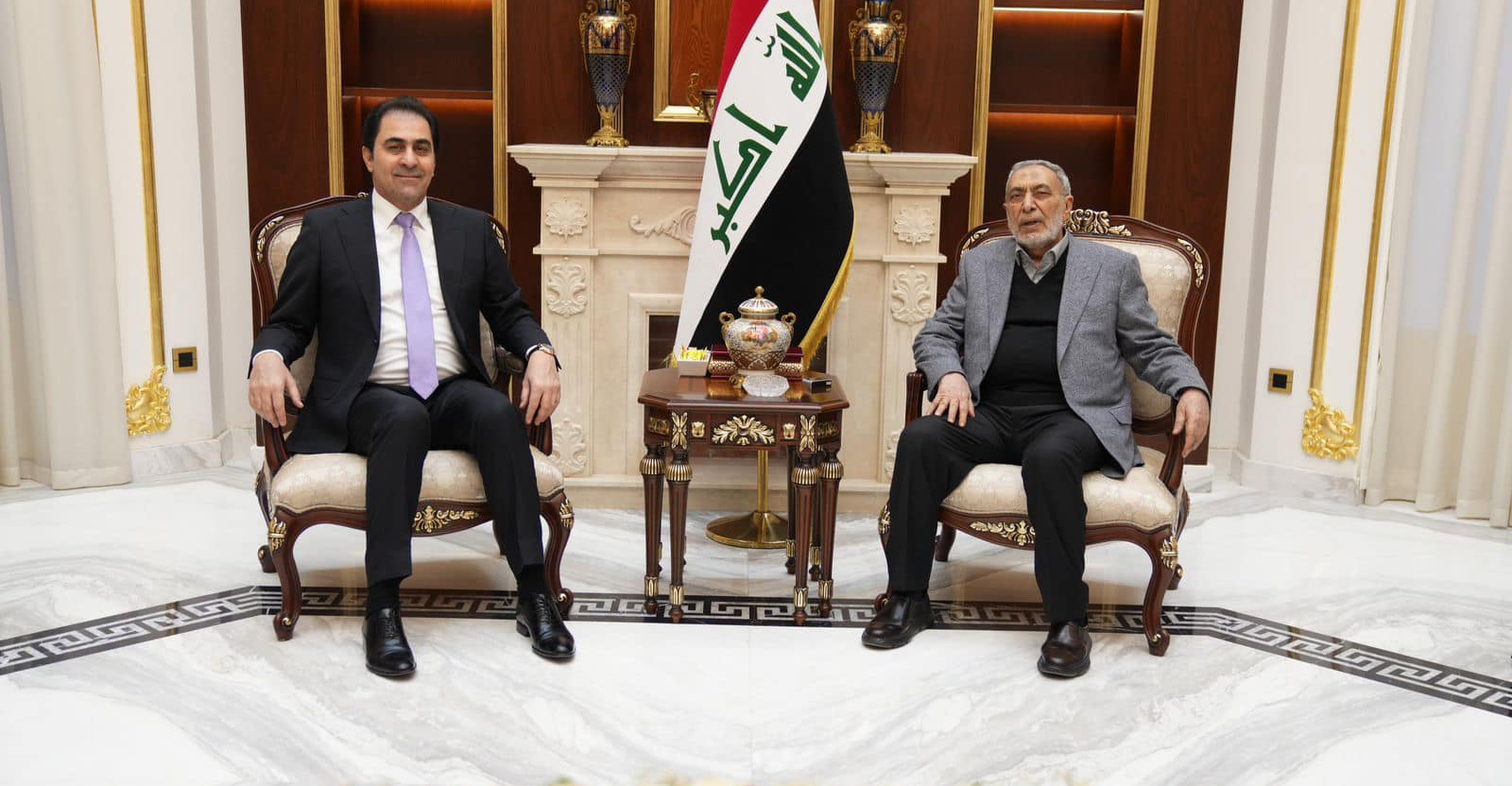 A political source reported on Monday that Sunni bloc MPs will meet tonight to issue a position on the disagreement between the parliament speaker and his deputy.
A political source reported on Monday that Sunni bloc MPs will meet tonight to issue a position on the disagreement between the parliament speaker and his deputy.
The source told Shafaq News Agency, “The Sunni blocs’ representatives will meet tonight to issue a position on the events that took place inside the Speaker of Parliament’s office.”
He added, “The origins of the incident date back to a verbal altercation over the phone between Parliament Speaker Mahmoud al-Mashhadani and his deputy, Mohsen al-Mandalawi. The latter arrived at al-Mashhadani’s office to continue the argument over statements regarding the Popular Mobilization Forces retirement law and other issues.”
Earlier on Monday, a parliamentary source revealed that a verbal altercation broke out inside the House of Representatives between Parliament Speaker Mahmoud al-Mashhadani, First Deputy Speaker Mohsen al-Mandalawi, and a number of Coordination Framework MPs, leading to the postponement of today’s session.
The source told Shafaq News Agency that the dispute erupted over Al-Mashhadani’s recent statements regarding the political process and elections.
Prior to that, al-Mashhadani said in a televised interview on Dijlah TV that Iraq was set to witness demonstrations next month, and that we might resort to an “emergency government” if security turmoil occurred in Iraq. He also confirmed that the United States had sent messages to all political leaders regarding the Popular Mobilization Forces (PMF), indicating that the US approach sought to integrate the PMF into the security forces, not restructure it.
Independent MP Alaa Al-Haidari told Shafaq News Agency, “The suspicious statements issued by Parliament Speaker Mahmoud Al-Mashhadani, who represents the highest authority in the Iraqi state and has made multiple media appearances, constitute a failure on his part.”
He added: “We demanded that the Speaker of the Council offer a public apology to the Iraqi people for insulting the Iraqi identity, which is more than 5,000 years old. This identity has been tainted by the blood of Imam Hussein and the martyrs. We will not accept insults to this identity. Al-Mashhadani must immediately apologize to the Iraqi people. If he does not, we will collect signatures to remove him from his position.”
Shafaq.com
Iran is losing the “Iraq axis.” The Economist: Factions are no longer sacrificing themselves for Tehran.
Iran is losing the “Iraq axis.” The Economist: Factions are no longer sacrificing themselves for Tehran.
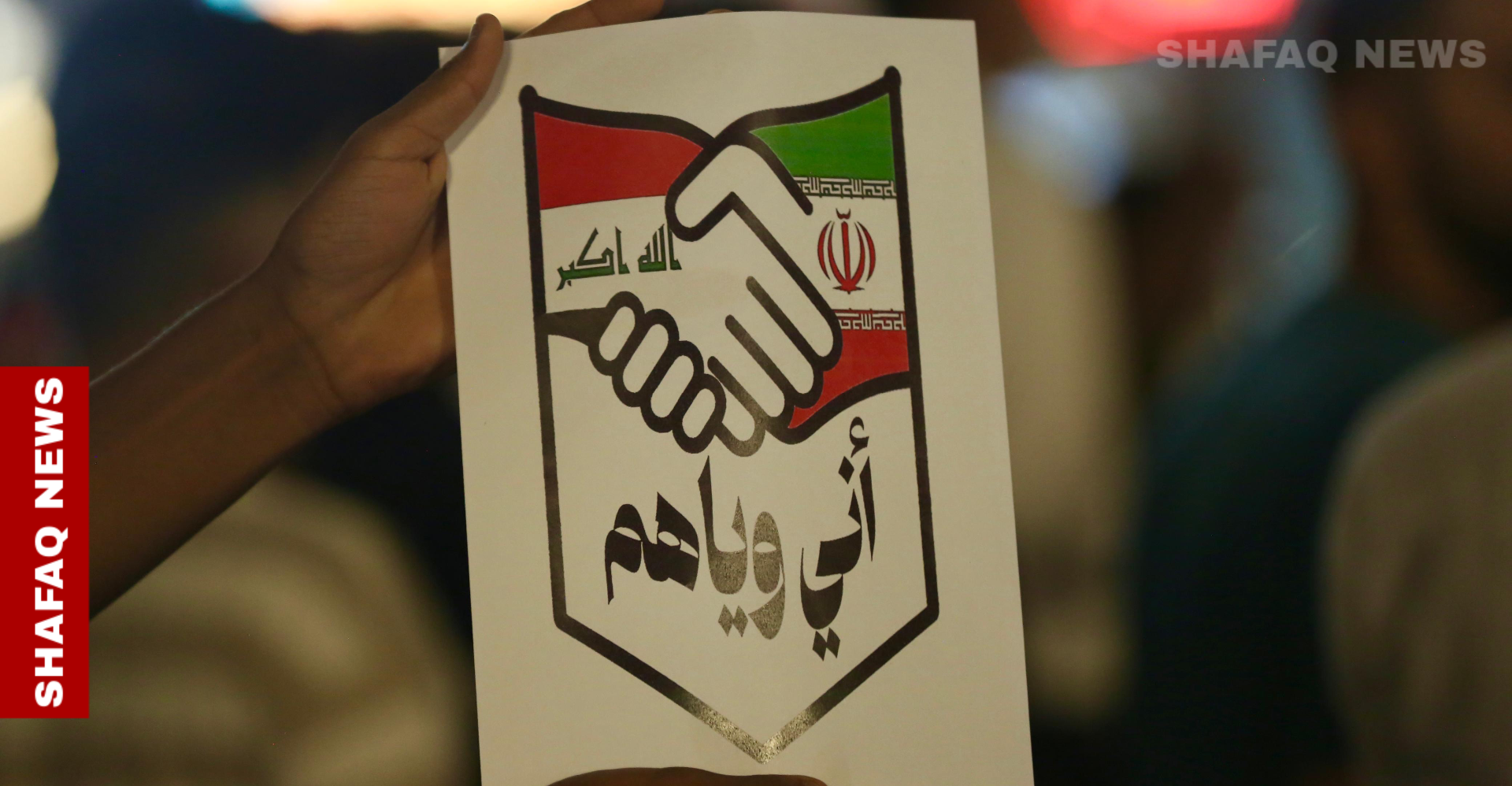 A British report confirmed that the Iranian regime’s hegemony over Iraq is declining, pointing to the Iraqi government’s avoidance of involvement in the 12-day war between Iran and Israel. It also provided evidence of Tehran’s declining influence and credibility among Iraqis.
A British report confirmed that the Iranian regime’s hegemony over Iraq is declining, pointing to the Iraqi government’s avoidance of involvement in the 12-day war between Iran and Israel. It also provided evidence of Tehran’s declining influence and credibility among Iraqis.
A report by the British magazine “The Economist,” reviewed by Shafaq News Agency, highlighted three main reasons for the decline of Iranian influence in Iraq, the most important of which is the emergence of a new generation of politicians in Iraq “who emerged from the anti-government protests of 2020 and oppose the Iranian-backed militias more vocally than before.”
According to the report, following the killing of Qassem Soleimani, commander of the Iranian Revolutionary Guard Corps’ Quds Force, in January 2020, Iran’s control over the militias and proxy groups it supports in Iraq has diminished, with many of them shifting their focus to internal Iraqi affairs.
The Economist magazine quoted a senior Iraqi official as saying that Esmail Qaani, Soleimani’s successor and current commander of the Quds Force, “does not possess Soleimani’s skill in managing the conflicting interests of Iraq’s various factions.”
The report pointed to another factor cited as contributing to the decline of the Iranian regime’s influence in Iraq: “The transformation of militias into political forces and their dissolution into the Iraqi bureaucracy and economy.”
He explained that Iran, in order to expand and deepen its influence in Iraq, paved the way for militia members to enter the Iraqi political and economic system.
Currently, members of these groups have extensive economic interests and control important ministries, including those related to oil and mineral exports. Until recently, they even wielded significant influence within Iraq’s Supreme Court, according to The Economist.
According to the report, former members of Iran-affiliated groups, who are now wealthy political forces in the Iraqi government and economy, unlike in the past, “have much to lose if their country enters into a war with the United States or Israel, which is why they are increasingly angry about Iraq’s role as a client state of the Iranian government.”
Based on this evidence, the Economist report concluded that the weakness of the meaning of “resistance” became apparent during Iran’s war with Israel and the United States, when even the Iranian government’s closest allies in Iraq offered little assistance to the Islamic Republic for fear of retaliation from the United States or Israel.
Shafaq.com
For the third consecutive month, the Central Bank of Iraq saw a significant decline in dollar sales.
For the third consecutive month, the Central Bank of Iraq saw a significant decline in dollar sales.
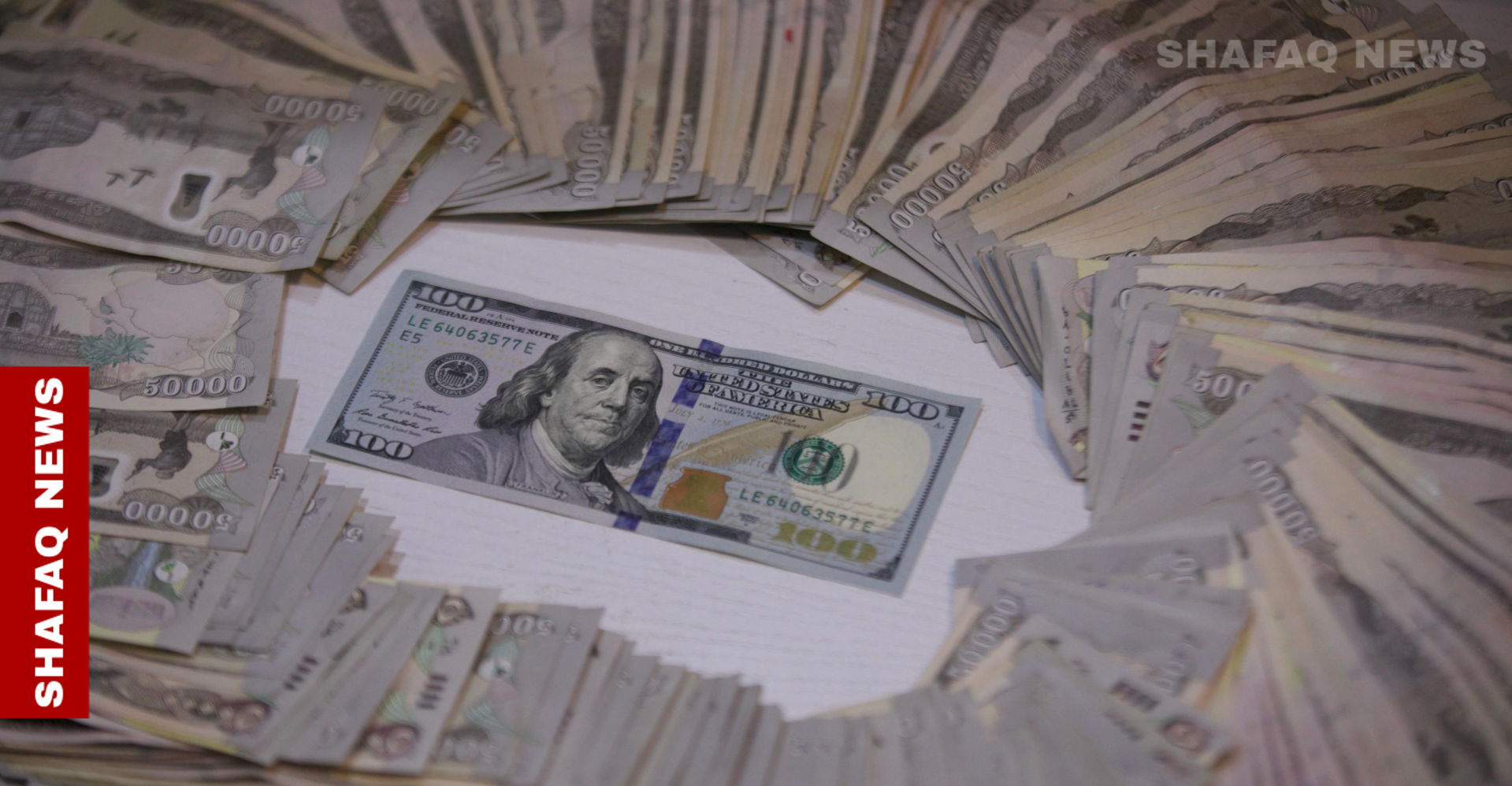 The head of the Iraq Future Foundation, Manar al-Obaidi, revealed on Monday that the Central Bank of Iraq’s foreign currency sales declined during the month of June.
The head of the Iraq Future Foundation, Manar al-Obaidi, revealed on Monday that the Central Bank of Iraq’s foreign currency sales declined during the month of June.
Al-Obaidi said in a post on his Facebook page, followed by Shafaq News Agency, that “the Central Bank’s foreign currency sales decreased for the third consecutive month, reaching $5.7 billion in June of this year, a decrease of 15.5% compared to May, when sales recorded $6.5 billion. Thus, the Central Bank’s foreign currency sales in the first six months of the year reached $37.2 billion, a decrease of 2.2% compared to the same period last year, which recorded $38.1 billion.”
He added that “cash sales of foreign currency also fell to their lowest level, reaching only $99 million in June, the lowest monthly sales value since the introduction of cash sales. Thus, the Central Bank’s total foreign currency sales through cash sales in the first six months of the year amounted to $1.4 billion, a 21% decline compared to the same period last year, which amounted to $1.76 billion.”
According to Al-Obaidi, foreign currency sales through the balance enhancement mechanism reached $5.6 billion in June of this year, a 35% increase compared to June of last year. Thus, foreign currency sales through the balance enhancement mechanism in the first six months of the year reached $35.8 billion, a 37% increase compared to the same period last year, which amounted to $26 billion.
He continued, “The international settlement mechanism through the Central Bank has also been completely halted, as has the transfer mechanism through the Central Bank. Foreign currency sales are now limited to balance-building and cash sales to travelers. Despite the decline in cash sales and the halt in international settlements, the dollar exchange rate has remained stable and unaffected by this decline.”
The central bank’s sales this year are expected to reach around $70 billion, down from last year’s sales of more than $80 billion, according to Al-Abidi.
He pointed out that “the decline in foreign currency sales, coupled with the stability of the dollar price on the parallel market and the decline in inflation levels, calls for a careful review to determine the reasons behind this decline. This could be related to the possibility of most traders entering the official market, which reduces the need for hard currency on the parallel market, or to a decline in demand for goods, which could reflect a state of economic stagnation in the Iraqi market.”
Shafaq.com
Tomorrow, the Sudanese government will receive a “final recommendation” regarding oil and salaries for Kurdistan employees.
Tomorrow, the Sudanese government will receive a “final recommendation” regarding oil and salaries for Kurdistan employees.
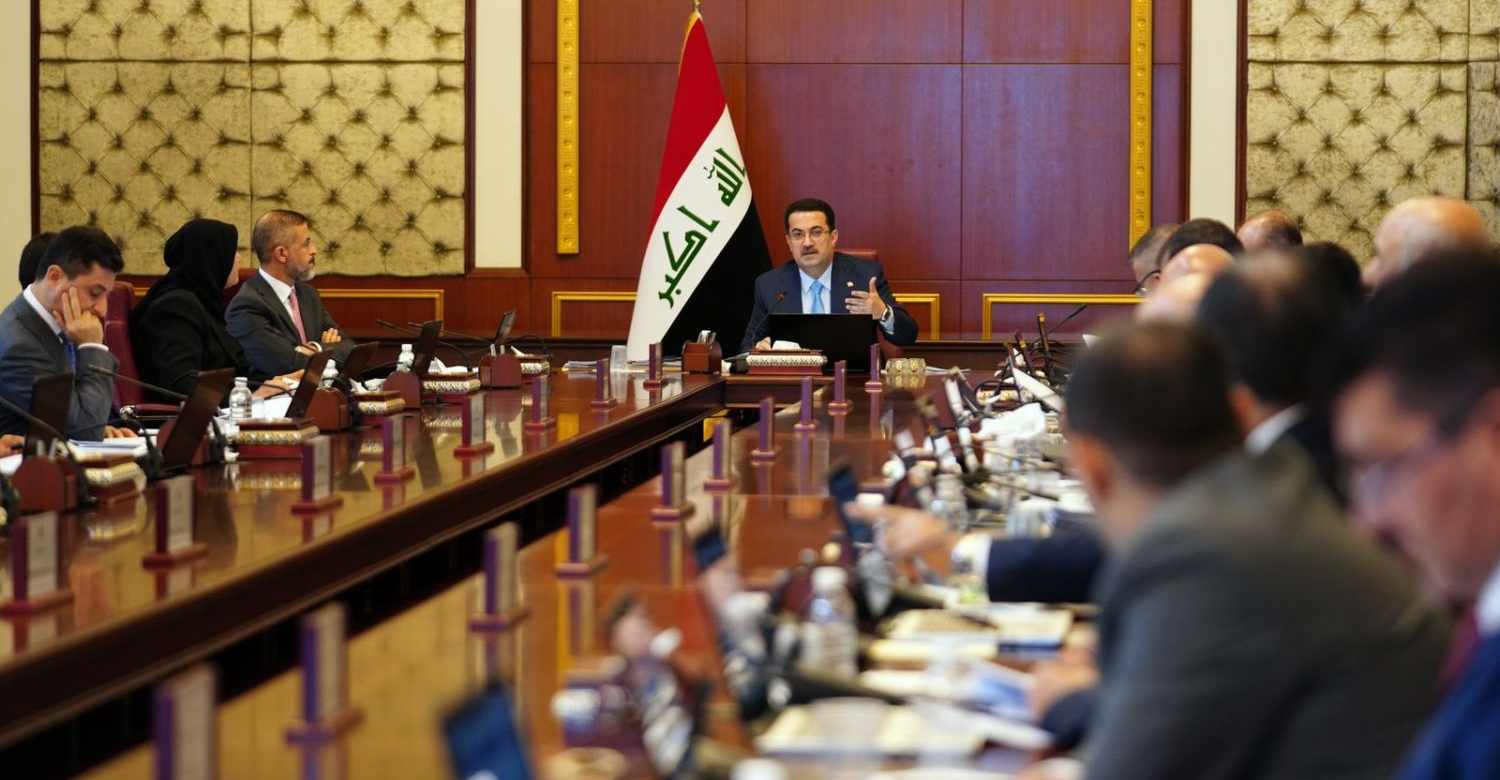 A Kurdish political source confirmed on Monday that the federal government will receive recommendations from the ministerial committee it formed last week on Tuesday regarding salaries and benefits for employees in the Kurdistan Region and the handover of the region’s oil to the state-owned oil company SOMO .
A Kurdish political source confirmed on Monday that the federal government will receive recommendations from the ministerial committee it formed last week on Tuesday regarding salaries and benefits for employees in the Kurdistan Region and the handover of the region’s oil to the state-owned oil company SOMO .
The source told Shafaq News Agency, “The ministerial committee formed by Baghdad last week regarding the salaries and benefits of Kurdistan Region employees and the region’s oil will submit its report to the Council of Ministers in a session tomorrow, Tuesday .”
He added, “The committee will read its report during the cabinet session, and based on the report, the proposals and solutions presented will be considered to reach an agreement and a final formula for releasing salaries for the region’s employees and handing over Kurdistan’s oil to the national oil company, SOMO .”
On July 8, Prime Minister Mohammed Shia al-Sudani ordered the formation of a ministerial committee to discuss the provisions of the budget law and Federal Supreme Court rulings regarding financial obligations between Baghdad and Erbil .
According to the government announcement, the committee is headed by the Deputy Prime Minister and Minister of Planning, and includes the Ministers of Construction and Housing, Higher Education, Justice, and Health .
Shafaq.com
Al-Mashhadani’s statements shake the political scene. Demands for an apology follow an urgent meeting.
Al-Mashhadani’s statements shake the political scene. Demands for an apology follow an urgent meeting.
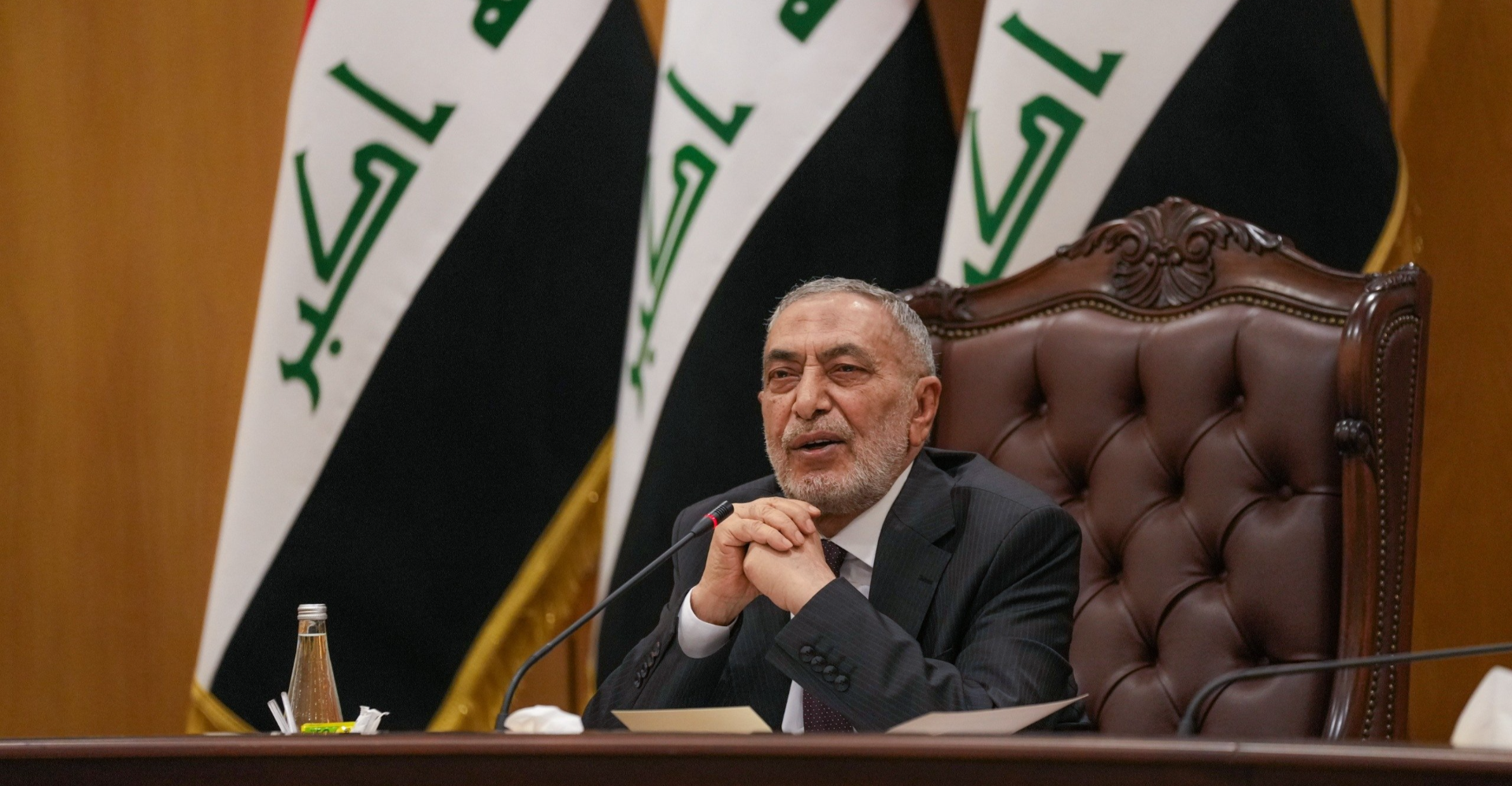 On Monday, parliamentarians attacked Speaker Mahmoud al-Mashhadani over statements he made warning of demonstrations that would destabilize Iraq. He also spoke of US pressure to dissolve the Popular Mobilization Forces (PMF). The MPs threatened to remove al-Mashhadani from his post .
On Monday, parliamentarians attacked Speaker Mahmoud al-Mashhadani over statements he made warning of demonstrations that would destabilize Iraq. He also spoke of US pressure to dissolve the Popular Mobilization Forces (PMF). The MPs threatened to remove al-Mashhadani from his post .
Independent MP Alaa Al-Haidari told Shafaq News Agency, “The suspicious statements issued by Parliament Speaker Mahmoud Al-Mashhadani, who represents the highest authority in the Iraqi state and has made more than one media appearance, constitute a failure on his part .”
He added: “We demanded that the Speaker of the Council offer a public apology to the Iraqi people for insulting the Iraqi identity, which is more than 5,000 years old. This identity has been tainted by the blood of Imam Hussein and the martyrs. We will not accept insulting this identity. Al-Mashhadani must immediately apologize to the Iraqi people. If he does not, we will collect signatures to remove him from his position .”
In a related development, independent MP Yousef Al-Kalabi told the agency, “Parliament Speaker Mahmoud Al-Mashhadani, First Deputy Speaker Mohsen Al-Mandalawi, and Second Deputy Speaker Shakhwan Abdullah are currently holding a meeting regarding what happened in today’s session .”
Al-Kalabi added, “Those currently meeting are keen to manage the legislative authority, keep it away from external conflicts, and reconvene sessions to read and legislate laws .”
Earlier on Monday, a parliamentary source revealed that a verbal altercation broke out inside the House of Representatives between Parliament Speaker Mahmoud al-Mashhadani, First Deputy Speaker Mohsen al-Mandalawi, and a number of Coordination Framework MPs, leading to the postponement of today’s session .
The source told Shafaq News Agency that the dispute erupted over Al-Mashhadani’s recent statements regarding the political process and elections .
Prior to that, al-Mashhadani said in a televised interview on Dijlah TV that Iraq was set to witness demonstrations next month, and that we might resort to an “emergency government” if security turmoil occurred in Iraq. He also confirmed that the US had sent messages to all political leaders regarding the Popular Mobilization Forces (PMF), indicating that the US approach was to integrate the PMF into the security forces, not restructure it .
Shafaq.com
Behind the scenes of the parliament session: A verbal altercation between Al-Mashhadani and the Framework deputies led to its postponement.
Behind the scenes of the parliament session: A verbal altercation between Al-Mashhadani and the Framework deputies led to its postponement.
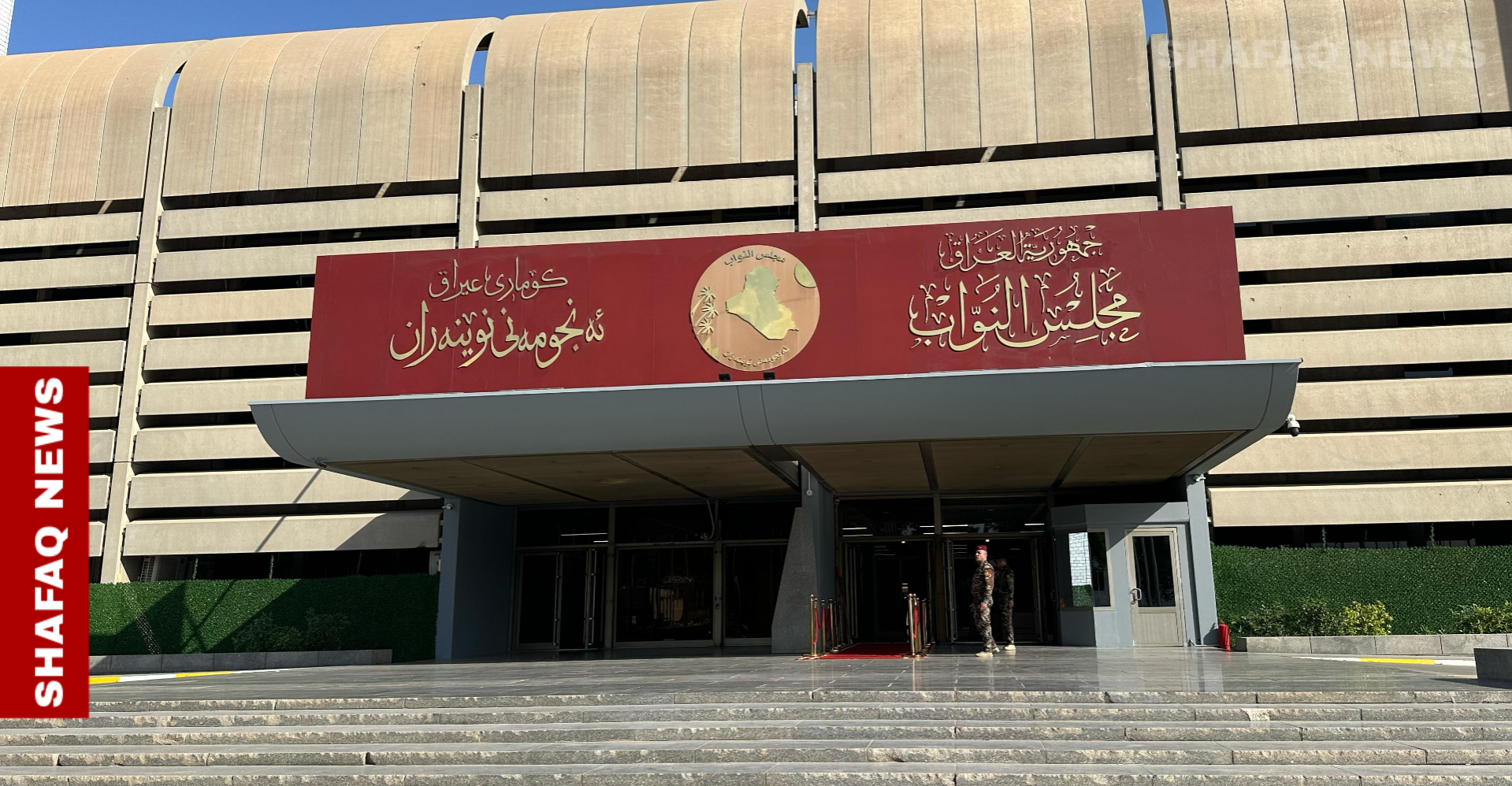 A parliamentary source revealed on Monday that a verbal altercation broke out inside the House of Representatives between Parliament Speaker Mahmoud al-Mashhadani, First Deputy Speaker Mohsen al-Mandalawi, and a number of Coordination Framework MPs, leading to the postponement of today’s session.
A parliamentary source revealed on Monday that a verbal altercation broke out inside the House of Representatives between Parliament Speaker Mahmoud al-Mashhadani, First Deputy Speaker Mohsen al-Mandalawi, and a number of Coordination Framework MPs, leading to the postponement of today’s session.
The source told Shafaq News Agency that the dispute erupted over Al-Mashhadani’s recent statements regarding the political process and elections.
He added, “The number of MPs present at today’s session exceeded 180, but the dispute led to Al-Mashhadani leaving the session hall and the postponement of the session until further notice.”
The source indicated that members of Parliament are currently holding a meeting in the parliament’s cafeteria to discuss collecting signatures from MPs to remove Al-Mashhadani from his position.
A short while ago, the House of Representatives Presidency issued a brief statement confirming the postponement of the parliamentary session until further notice due to a lack of quorum.
Al-Mashhadani appeared in a televised interview yesterday, saying that the coming period could witness demonstrations leading to an emergency government. He also described the Iraqi identity as “ridiculous.”
Shafaq.com
Oil Minister informs Parliament: We have not reached an agreement with Kurdistan
Oil Minister informs Parliament: We have not reached an agreement with Kurdistan
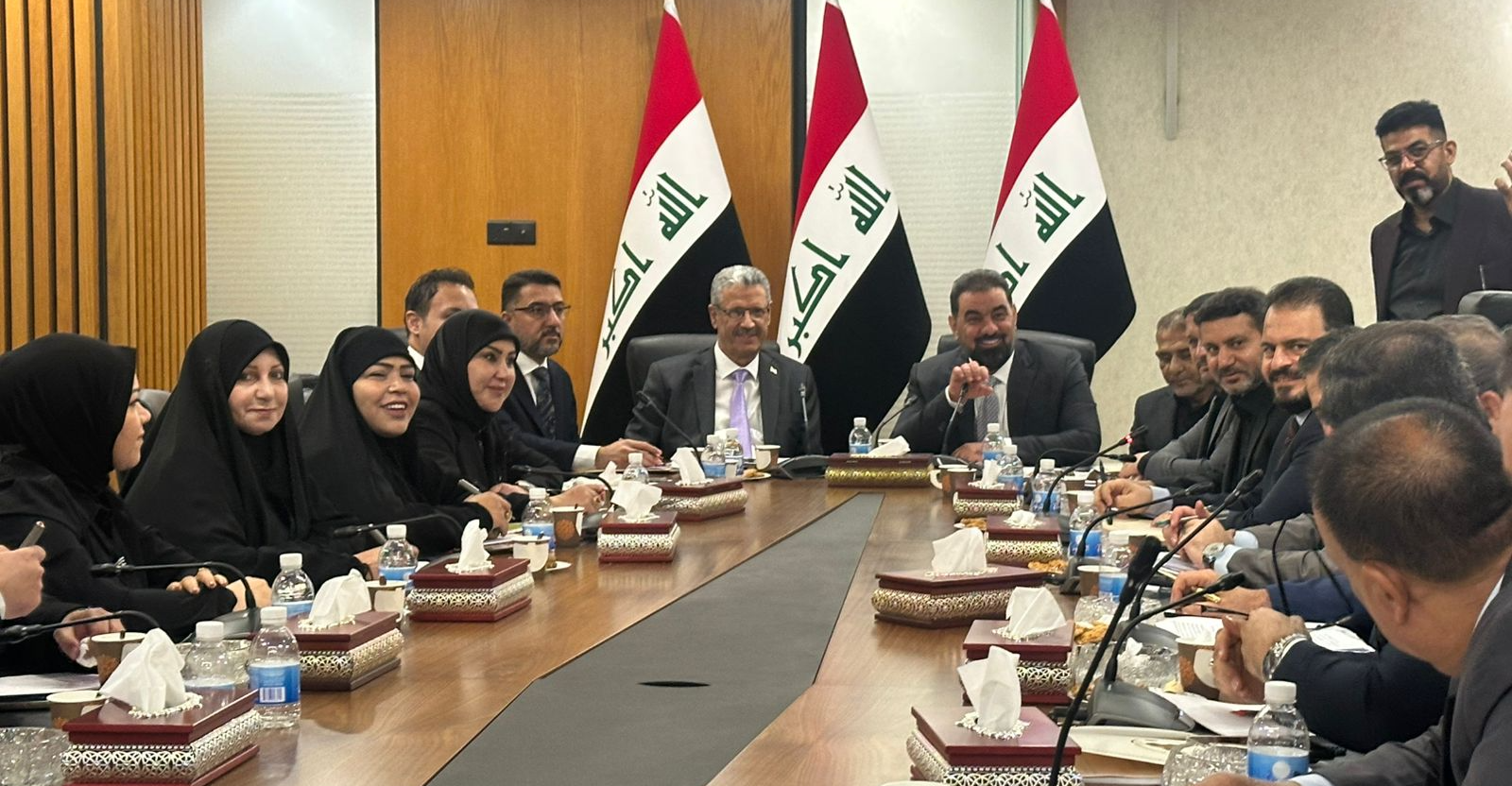 A member of the parliamentary oil committee, Bahaa al-Din Nouri, revealed on Monday that federal oil minister Hayan Abdul Ghani confirmed that the Kurdistan Region would not abide by the agreement regarding exports via the Turkish-Ceyhan pipeline. Nouri also indicated that a delegation from the region would arrive in Baghdad.
A member of the parliamentary oil committee, Bahaa al-Din Nouri, revealed on Monday that federal oil minister Hayan Abdul Ghani confirmed that the Kurdistan Region would not abide by the agreement regarding exports via the Turkish-Ceyhan pipeline. Nouri also indicated that a delegation from the region would arrive in Baghdad.
Nouri told Shafaq News Agency, “The committee held a meeting today in the House of Representatives and hosted the Minister of Oil and senior staff from the ministry to inquire and discuss a number of important laws.”
He added, “The meeting discussed the Kurdistan Region’s oil file and the status of negotiations between the central government and the region. According to the minister, there are points of disagreement in the negotiations, and no conclusion has been reached, including local consumption and the transfer of financial revenues to the federal government.”
He stressed that ” the Ministry of Oil has completed all procedures and the region’s oil can be exported via the Turkish-Ceyhan pipeline, but the region has not complied with what was agreed upon in Article 12 of the budget law, especially since the consulting company is ready, but the region has also refused its entry.”
He added, ” A delegation from the regional government will visit Baghdad within the next 24 hours to reach an agreement in accordance with the proposed proposals.”
The Iraqi Parliament’s Oil, Gas, and Natural Resources Committee announced that it would host the Minister of Oil and a number of senior ministry officials on Monday to discuss issues described as “serious.”
“The meeting will focus on what he described as a structural collapse within the Ministry of Oil, amid indications of the influence of external parties, including a figure called ‘Omid,’ who has come to control sensitive areas within the ministry,” the committee’s spokesman, MP Ali Shaddad, told Shafaq News Agency.
Shaddad pointed out that “Iraq faces the risk of US sanctions being imposed on the Ministry of Oil due to violations and mismanagement that could be interpreted as a breach of international obligations,” warning that this “could lead to widespread economic paralysis and a collapse in the country’s financial revenue stream.”
The US Treasury Department had previously imposed a package of sanctions on individuals and entities involved in fuel smuggling and illicit gains that fund armed groups in the region. International reports warned that official Iraqi institutions could also be subject to these measures if their complicity or leniency is proven.
Iraq’s budget is almost entirely dependent on oil exports, making any sanctions on the Ministry of Oil or its companies, such as SOMO, a direct threat to economic stability.
Shafaq.com
